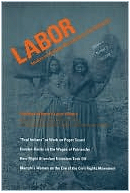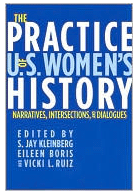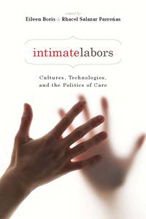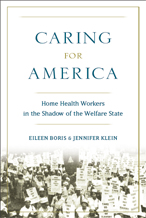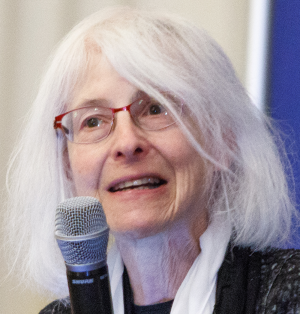
Office Location:
Specialization:
Labor Studies, Gender, Race, Class, Women's History, Social Politics
Education:
1981 Ph.D. Brown University (American Civilization)
1974 M.A. Brown University (American Civilization)
1970 B.A. Boston University, College of Liberal Arts, Summa Cum Laude with Distinction (English Language and Literature and American History and Civilization)
Bio:
Areas of study:
- gender, race, and class;
- feminist theory;
- labor studies;
- social politics;
- women, work, and welfare;
- women's and gender history
Statement:
I came of age with the social movements of the 1960s and 1970s. Growing up disadvantaged compared to wealthy neighbors, I identified not with my “betters” but with the civil rights movement. I was there during the Viet Nam war when police invaded Marsh Chapel at Boston University to arrest an AWOL soldier, when Bill Baird challenged the law by handing out contraceptives to unmarried students, when African Americans organized against police brutality, and when thousands of women in 1970 declared our liberation while marching to commemorate the winning of suffrage fifty years before.
Finding traditional academic boundaries too artificial, I trained as an interdisciplinary historian in American Studies and my professors were open to making the study of women my major field. While a graduate student, I was part of a collective that developed the first women's studies class at Brown. In the mid-1970s, I taught women in the modern world at a time when we had to xexox books written by earlier generations of feminists, going back to the mid-19th century. I started to focus on women workers when, as part of the Chicago Women’s Liberation Union, I created a slide show illustrating the struggles of women wage earners and helped launch the film, “Union Maids.” I learned as much from active engagement in current struggles as I did from my classes.
I like to joke that I have only two topics, home and work, and they are the same. My first book on the arts and crafts movement of the early 20th century considered the social meaning of design and ended up asking, what is work and who is a worker? Gender and the state moved to the center of my subsequent book on the politics of industrial homework, which received the 1995 Philip Taft Prize in Labor History. In addressing the “problem” of the wage-earning mother, I challenged the division of home from work, private from public that the existence of paid labor in the home denies. Going to India as part of a consultation sponsored by the International Labor Organization and the Ford Foundation on home-based labor really shifted my analysis, as did meeting the activists who created the Self-Employed Women’s Association (SEWA) and who confronted the global politics of women and development in their daily work. I subsequently co-edited a collection on homework around the globe as an intervention into ongoing debates over globalization and as an expression of transnational feminist praxis. Teaching in Finland, Japan, and Australia also provided new lenses from which to view the United States.
Gender was fundamental to the shaping of state policy, but so too was race. In college, I worked as an intern for the Massachusetts Commission Against Discrimination but, more to my liking, as part of grass-roots efforts to empower those who lived in public housing and sought economic, political, and social justice. For fourteen years, I had the privilege of teaching at Howard University, the nation’s premier HBU (Historically Black University) where I gained as much, if not more, from my students than I gave them. In a series of articles, and a book in progress, I have interrogated the provision of citizenship rights through employment in the United States to explore how social policy reflects and shapes racialized gender. As part of the effort to block punitive welfare reform in the mid 1990s, I was part of the Women’s Committee of 100 for Welfare Justice and began investigating the history of welfare rights.
My project on the how home care workers, mostly women of color, became the new face of the labor movement brings together many of these concerns: the home as workplace, the valuing of women’s labors, the connection between public and private, the ways that state policy reinforces inequality, and the failure of welfare reform. I’ve been able to combine scholarship with activism in working with trade unionists, disability rights activists, senior advocates, and others to improve in-home care. I’ve engaged in participatory action research as part of the Women’s Economic Justice Project in our region. My new project considers the making of the woman worker as a distinct kind of worker through a history of the International Labor Organization. I look at various labor conventions and discourses of protection, equality, development, gender, and decent work over the last century from its founding in 1919.
After a stint at the University of Virginia in Studies in Women and Gender, I came to UCSB in 2001. UCSB has offered interdisciplinary focus, commitment to gender and ethnic studies, and an environment for doing scholarship that matters. It is an honor and a responsibility to hold the Hull Chair.
Hull Endowed Chair:
As an expression of his commitment to UC Santa Barbara and women's rights, in 1998 UCSB Foundation Trustee M. Blair Hull ('65) endowed a chair in the then Women's Studies Program. The endowment supports the teaching and research activities of a distinguished interdisciplinary scholar who is working to advance the understanding of women, gender, and social justice. The Hull Chair is the first endowed chair in the field at the University of California.
Publications:
|
|
Books: Engendering Transnational Transgressions: From the Intimate to the Global. Edited by Eileen Boris, Sandra Trudgen Dawson, and Barbara Molony. Routledge, 2021. Making the Woman Worker: Precarious Labor and the Fight for Global Standards, 1919-2019. Oxford University Press. 2019. Women's ILO: Transnational Networks, Global Standards, and Gender Equity. Edited by Eileen Boris, Dorothea Hoehtker and Susan Zimmermann. Brill and ILO, 2018. Caring for America: Home Health Workers in the Shadow of the Welfare State (co-authored with Jennifer Klein). Oxford University Press, 2012. Winner of the 2013 Sara A. Whaley Prize for best book on women and labor, NWSA. Intimate Labors: Care, Sex, and Domestic Work, ed. with Rhacel Salazar Parreñas. Stanford University Press, 2010. The Practice of US Women’s History: Narratives, Dialogues, and Intersections. Edited by S.J. Kleinberg, Eileen Boris, and Vicki Ruiz. Rutgers University Press, 2007. Major Problems in the History of American Workers, Second Edition. Edited by Eileen Boris and Nelson Lichtenstein. D.C. Heath/Houghton Mifflin, 1991 second edition, 2003 Voices of Women's Historians: The Personal, the Political, the Professional. Edited by Eileen Boris and Napur Chaudhuri. Indiana University Press, 1999 Homeworkers In Global Perspective. Edited by Eileen Boris and Elisabeth Prugl. Routledge, 1996 Home to Work: Motherhood and The Politics of Industrial Homework in the United States. Cambridge University Press, 1994 (Winner of the 1995 Philip Taft Prize in Labor History) Homework: Historical and Contemporary Perspectives on Paid Labor at Home. Edited by Eileen Boris and Cynthia Daniels. University of Illinois Press, 1989 Art and Labor: Ruskin, Morris, and the Craftsman Ideal in America. Temple, 1986 (paperback 1988) Guest Editor: "Work, Poverty, and Policy," co-editor with Sasha Coles, Women's History Review, March 2021 "Beyond Maids and Madams: Can employers be allies in new policies for domestic workers' rights?" Forum, Edited with Sabrina Marchetti, Giulia Garofalo-Geymonat, Eileen Boris, and Jennifer Fish, Open Democracy, January 30, 2018 "Historicizing Domestic Labor: Resistance and Organizing," co-editor with Premilla Nadasen, International Labor and Working Class History (ILWCH), No.88, Fa;; 2015 “Intersectional Perspectives in Policy History,” Journal of Policy History, 24, Winter 2012. “Sex Work,” Journal of the History of Sexuality, with Stephanie Gilmore and Rhacel Parreñas, 13, no.2 (April 2010) “The New Women’s Labor History,” Labor: Studies in Working-Class History of the Americas, 3:3 (Fall 2006). "Women's Labors," Journal of Women's History, 15:4 (Winter 2004) "Contemplating Categories: Gender, Class, Race, and Ethnicity," International Review of Social History, 1999 Supplement, published as a paperback book by Cambridge University Press, 2000 Recent Articles:
with J. Jensen, “The ILO: Women’s Networks and the Making of the Woman Worker,” in Women and Social Movements International, T. Dublin and K. Sklar, eds., Alexander Press, 2012, available at http://wasi.alexanderstreet.com/View/1879476/ with J. Klein, “When the Present Disrupts the Past,” in Potter and Romaro, Doing Recent History (Athens: University of Georgia Press, 2012), 249-73 “Home and Work,” in Labor Rising, ed. Katz and Greenwald (New York: New Press, 2012), 100-110 “Ledbetter’s Continuum: Race. Gender, and Pay Discrimination,” in Feminist Legal History: Essays on Women and the Law, ed. Thomas and Boisseau (New York: NYU Press, 2011), 240-56 with A. Orleck, “Feminism and the Labor Movement: A Century of Collaboration and Conflict,” New Labor Forum 20 (Winter, 2011), 33-41 “Feminism’s Histories,” Feminist Formations, 22,n.1 (Spring 2010), 90-97 “No Right to Layettes or Nursing Time:” Maternity Leave and the Question of United States Exceptionalism,” in Workers across the Americas: The Transnational Turn in Labor History, ed. Fink (New York: Oxford University Press, 2010), 171-93 with J. Klein, “Making Home Care: Law and Social Policy in the U.S. Welfare State,” in Intimate Labors, ed. Boris and Parreñas, 187-203 “Politicizing Women’s History, Engendering Policy History,” Journal of Policy History, 24 (October, 2009) with Premilla Nadasen, “Domestic Workers Organize!,” Working USA, 11 (December, 2008), 413-37 with Ava Baron, "El cuerpo en el trabajo: la in-corporación en términos de clase, etnia y género," in Teresa Porzecanski, ed. El cuerpo y sus espejos: estudios antropológico-culturales. (Montevideo, Uruguay: Planeta, 2008), 175-90 With Christine Eifert, “Geschlecht: Zwänge Und Chancen,” in Christof Mauch and Kiran Patel, eds. Wettlauf in die Moderne (Munich: DVA, 2008), 259-93 “Labor’s Welfare State: Defining Workers, Constructing Citizens,” in Christopher Tomlins and Michael Grossberg, eds., The Cambridge History of American Law, vol. III (New York: Cambridge University Press, 2008), 319-58 “On Cowboys and Welfare Queens: Independence, Dependence, and Interdependence at Home and Abroad,” Journal of American Studies, 41:3 (December, 2007), 599-621 with Jennifer Klein, “’We Were the Invisible Workforce’: Unionizing Home Care,” in D.S. Cobble, The Sex of Class: Women Transforming American Labor (Ithaca: Cornell University Press, 2007), 177-93 “Up for Debate Symposium” on Eileen Boris and Ava Baron, “The Body as a Category for Working Class History,” Labor, 4:2 (Summer, 2007), 23-43, with critiques by John Kasson, Susan Glenn, and Valerie Burton, and reply by the authors, “In Response: Dichotomous Thinking and the Objects of History; or, Why Bodies Matter, Again,” 61-3 “Gender After Africa!,” in Africa After Gender!, ed. Catherine M. Cole, Takyiwaa Manu, and Stephan F. Miescher (Bloomington: University of Indiana Press, 2007), 191-204 “Desirable Dress: Rosies, Sky Girls, and the Politics of Appearance,” ILWCH, No.69 (Spring 2006), 123-42 with Carolyn Lewis, “Caregiving and Wage-Earning: A Historical Perspective on Work and Family,” in The Handbook of Work and Family: Multidisciplinary Perspectives and Approaches, ed. Pitt-Catsouphes, Kossek, and Sweet (Mahwah, H.J.: Lawrence Erlbaum, 2006) 73-97 with Jennifer Klein, “Organizing Home Care: Low Waged Workers in the Welfare State,” Politics and Society, 34:1 (March 2006), 81-106 “The Power of Naming: Gender, Race, and the Writing of Policy History,” Journal of Policy History, 17:1 (March 2005), 72-92 “Changing Public Debate on Work and Families: A Historical Perspective,” in Christopher Beem and Jody Heymann, eds., Anthology on Work and Family (New York: New Press, 2005), 36-62 “‘Social Responsibility on a Global Level’: The National Consumers’ League, Fair Labor, and Worker Rights at Century’s End,” in A Coat of Many Colors: Immigration, Globalism, and Reform in the New York City Garment Industry, ed. Daniel Soyer (New York: Fordham University Press, 2005), 211-33 “Contested Rights: How the Great Society Crossed the Boundaries of Home and Work,” in The Great Society and the High Tide of Liberalism, eds. Sidney Milkis and Jerome Mileur (Amherst: University of Massachusetts Press, 2005), 115-44 “The Gender of Discrimination: Race, Sex, and Fair Employment,” in Sibyl A. Schwarzenbach and Patricia Smith, eds., Women and the U.S. Constitution; History, Interpretation and Practice (Columbia Univ. Press, 2004), 273-91 “Consumers of the World Unite! Campaigns Against Sweating, Past and Present,” in Sweatshop USA: The American Sweatshop in Historical and Global Perspective, eds. Daniel E. Bender and Richard A. Greenwald (New York: Routledge, 2003), 203-24 with J. Kleinberg, “Mothers and Other Workers: (Re)Conceiving Labor, Maternalism, and the State,” Journal of Women’s History, 15:3 (Autumn, 2003), 90-117 Selected Other Writing: In collaboration with the Women’s Economic Justice Project, Enough Injustice: Voices of Central Coast Working Women. Policy Report, CAUSE, Women’s Economic Justice Project, 2006 Review of Pun Ngai, Made in China and Interview with Pun Ngai, New Labor Forum, 15:2, Summer 2006, 125-31 With Linda Delp, Gwen Chang, Ruth Matthias, and Carol Zabin, Workforce Needs of California’s Homecare System CPRC Briefing Paper, May, 2004 at http://www.ucop.edu/cprc/boris.pdf Co-principal investigator, with Marcos Vargas, Challenging the Feminization of Poverty: Women in Poverty in the Central Coast Region of Ventura and Santa Barbara Counties, A Report by the Central Coast Alliance United for a Sustainable Economy (CAUSE), Women’s Economic Justice Project, 2002, 'The Hardest Struggle:' Women and Sweated Industrial Labor, A Unit of Study for Grades 7-12. Eileen Boris and Rita Koman. Organization of American Historians and National Center for History in Schools, University of California, Los Angeles. 2002 Op-Eds:
“The Ghost of Hiram Johnson is Looking over Brown’s Shoulder,” Sacramento Bee, September 6, 2012. With Jennifer Klein, "Home-Care Workers Aren't Just 'Companions'," New York Times, July 1, 2012. With J. Klein, “Promises Kept? Obama Acts on Home Care,” Dissent Arguing the World, December 22 http://dissentmagazine.org/atw.php?id=640 “Bringing Rights for Domestic Workers out of the Closet,” Huffington Post, March 25 at http://www.huffingtonpost.com/eileen-boris/bringing-rights-for-domes_b_840544.html With J. Klein, “’Not Really a Worker’: Home-Based Unions Challenged in Court,” Labor Notes October 19 at http://www.labornotes.org/2010/10/%E2%80%98not-really-worker%E2%80%99-home-based-unions-challenged-court “Carework: When Equality Is Not Enough” New Deal 2.0 Forum on the “Mancession,” http://www.newdeal20.org/2010/10/28/carework-when-equality-is-not-enough-24441/, October 28 “Identity and the Politics of Book Reviewing,” Women=Books, Blog of Women’s Review of Books, June 28 at www.wcwonline.org/component/option,com_myblog/show,Identity-and-the-Politics-of-Book-Reviewing.html/Itemid,377/ With J. Klein, “Organizing Home Care,” “Valuing Domestic Work,” ed. by Gisela Fosado and Janet Jackobsen, S & F On-Line (Scholar and the Feminist), vol. 8:1 (Fall) at http://www.barnard.edu/sfonline/work/klein_boris_01.htmWith Jennifer Klein, "Laws of Care: The Supreme Court and Aides to Elderly People" Dissent, Fall 2007, 128-30 "Home-Care Providers Deserve Decent Wage," Santa Barbara News-Press, July 9, 2001, A12. With Nelson Lichtenstein, "Home-Office Debate Isn't New," LA Times, Jan. 9, 2000. Museum Catalogue Essays: "Women in the USA, 1900-2000: Social Change and Changing Experience," in Pat Kirkham, ed., Women Designers in the USA, 1900-2000: Diversity and Difference (Yale Univ. Press and the Bard Graduate Center for Studies in the Decorative Arts, 2000) |
Courses:
Courses Taught:
- FEMST 120
- FEMST 181
- FEMST 210
- FEMST 215
- FEMST 270
- FEMST 595

